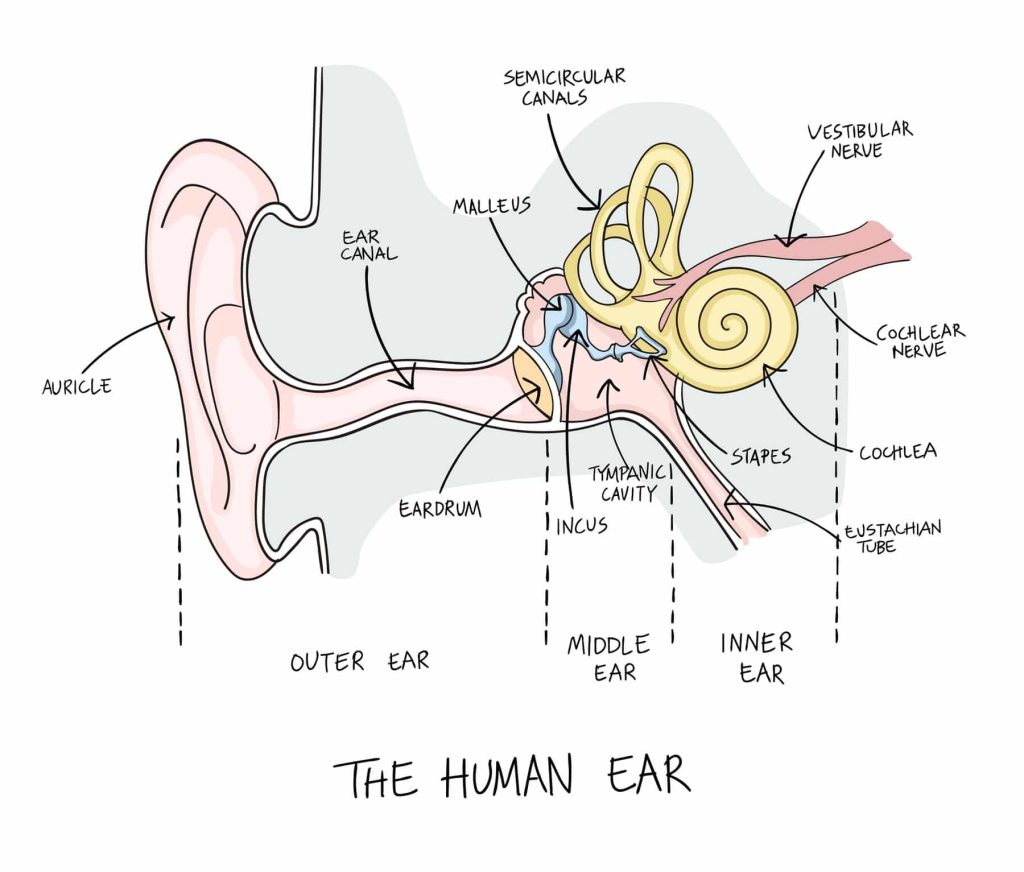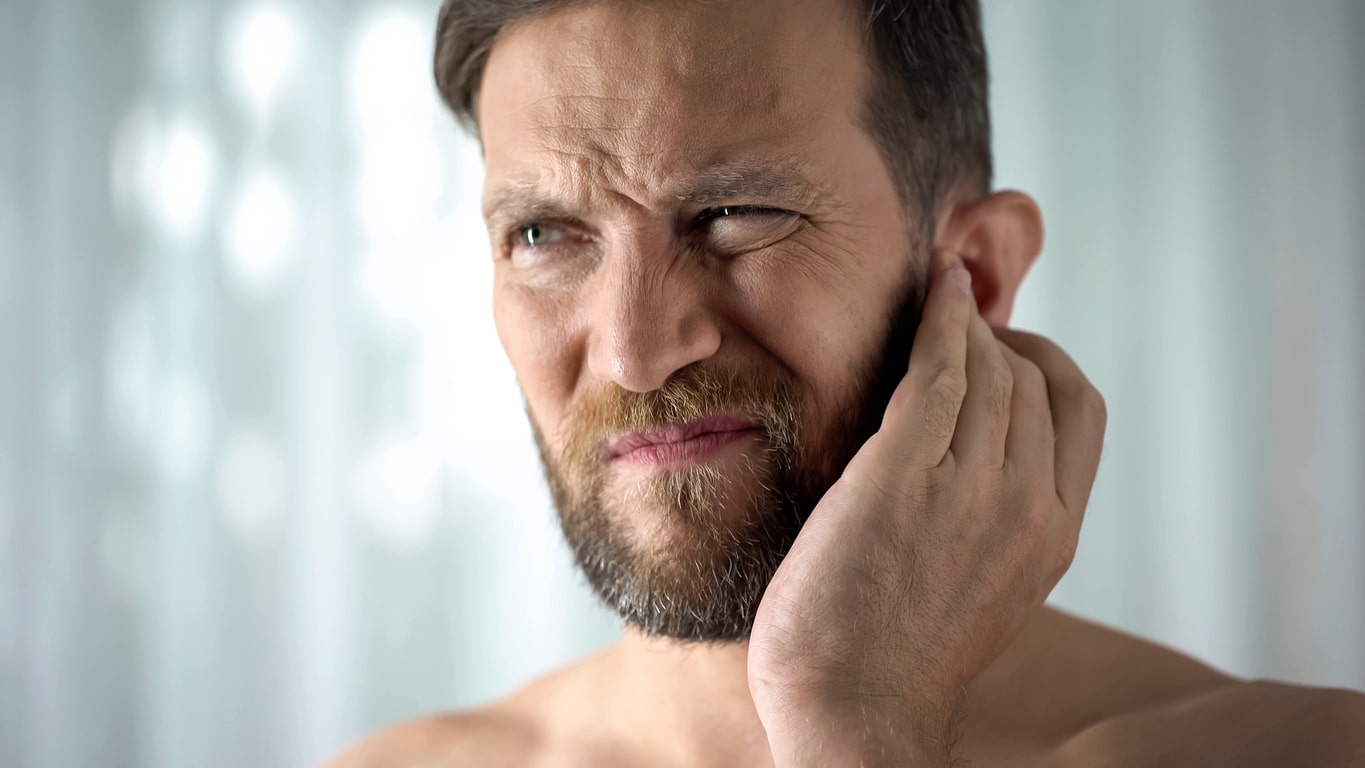Waking up with ear pain can be incredibly frustrating and disruptive. Ear infections in adults…

All Things Audiology at ExcelENT
Audiology at ExcelENT
You know that an audiologist specializes in ears, but what exactly does that mean? What does a doctor of audiology treat, and how do you know when it’s time to see one? In this post, we’re sharing the wide variety of audiology services available at ExcelENT with our resident ear expert, Dr. Helen Lee Miles.
What is audiology?
Audiology is the study of hearing. Since the inner ear plays such an essential role in balance, it’s also included under the audiology umbrella. Modern audiology combines technology with medical knowledge to find solutions for hearing and balance disorders. Audiologists work with individuals from birth through adulthood.
Audiology Fast Facts
- One of our earliest records of audiology is from Hippocrates, a Greek doctor, who conducted studies on hearing loss in the 4th century BC.
- The first hearing aid, called an Akouphone, was invented in 1898.
- The audiometer was invented in 1920 to measure hearing loss.
- One of the most significant periods of hearing loss research occurred as WW2 veterans returned home with noise-induced hearing loss from their service.
Ear Infections
Did you know that ear infections are typically due to fluids trapped in the middle ear? Colds, allergies, and throat infections often go hand-in-hand with inflammation, which makes it more difficult for fluids to drain from the ears.
Ear infections are more common in children than adults because their immune systems aren’t as strong. Recurring ear infections can cause permanent hearing damage, so if your child complains of ear pain, muffled hearing, nausea, or fever, have him or her checked for an ear infection right away.

Eustachian Tube Dysfunction
Eustachian tubes run between the middle ear and upper throat. They equalize ear pressure and help drain fluid out of the middle ear. Eustachian tube dysfunction, ETD, occurs when the tubes are blocked by fluids, causing pain and hearing trouble.
ETD can be temporary, such as when you quickly change altitude in an airplane. It can also be persistent, such as during a cold. Temporary ETD is usually easy to remedy with a yawn, by chewing gum, or by swallowing. ETD that lasts over a week may require medical treatment, so you may want to see an audiologist if your ears feel “full” or plugged for several days in a row.
Tinnitus
Have you ever heard phantom ringing, buzzing, or hissing in one or both of your ears? If so, then you’ve experienced tinnitus. Possible causes of tinnitus include exposure to loud noises, age-related hearing loss, head/neck/ear injuries, or circulatory disorders.
There are tiny hair-like cells in your ears that respond to pressure changes. However, if they sustain an injury, they may send signals that your brain interprets as ringing. You can prevent tinnitus by wearing hearing protection when you’ll be in loud environments. Also, maintaining good cardiovascular health helps keep blood vessels healthy, which may improve tinnitus symptoms.
Hearing evaluations & hearing loss
As we age, it’s common to experience some hearing loss. Without stimulation over the course of several years, someone with hearing loss may actually lose some brain pathways and connections that are essential for understanding spoken words. During a hearing evaluation, Dr. Miles will conduct a speech test to assess a patient’s speech discrimination skills. Her goal is to determine whether a person would benefit from a hearing aid or not.
Hearing evaluations also include a full health history, a physical examination of the ears, and a tympanometry test, which assesses the pressure in the ear and how the eardrum reacts to stimulation. To evaluate a person’s degree of hearing loss, Dr. Miles uses a pure-tone test, which is a series of tones from 250 hertz to 8000 hertz to see which sounds a patient can hear.
Hearing devices
Modern hearing aids include everything from sound amplifiers to sound dampeners.
Hearing aids are one of the most recognizable hearing devices. They include three primary components:
- A microphone that hears the sounds around you
- An amplifier that increases the volume of the sounds
- A receiver that sends the sound signals into the ear
Not everyone can benefit from hearing aid use, but many people who do not currently use them could experience improved hearing with the use of one.
Another common hearing device is a custom earplug. Exposure to loud noise leads to hearing loss over time. Musicians and concertgoers, hunters, people who work in noisy environments, or military personnel may benefit from custom earplugs to preserve their hearing.
ExcelENT makes custom plugs in a variety of materials, textures, and patterns to suit any use or style. After a quick ear impression, we create a custom mold that filters out noises that are detrimental to your hearing health, while still allowing you to hear sounds around you. Did you know that it’s possible to block out damaging sounds at a concert, but let in the sounds that will help you appreciate the music?
Vestibular/balance testing
The vestibular system is a sensory system, mainly in the inner ear, that provides the brain with information about your body’s movement, head position, and spatial orientation. It’s essential for balance, movement, and maintaining your sense of equilibrium.
A recent epidemiological study estimated that nearly 35% of adults over the age of 40 have experienced some sort of vestibular dysfunction at some point in their life. Benign paroxysmal positional vertigo (BPPV) is one example of a vestibular disorder that is associated with balance difficulties. Treatments may include head, body, and eye exercises to retrain the brain to better understand signals from the vestibular system.
Cerumen management (ear wax removal)
Cerumen, or ear wax, protects your ears from bacterial infections and water, while keeping them moisturized and free of dust, dirt, and debris. Excess wax usually gets worked out by normal jaw movements, but if that fails, cerumen can build up and cause pain, difficulty hearing, itching, and even tinnitus.
You may be able to remove impacted cerumen with saline irrigation or cerumenolytic solutions that dissolve wax. If that doesn’t work, you may need to schedule an appointment with an audiologist for manual removal. You should not attempt manual removal yourself because doing so can injure your ears.
No matter your ear ails, ExcelENT has you covered!
If you’re experiencing ear pain, having trouble hearing, or struggle with your balance, get in touch. Dr. Helen Lee Miles works with patients of all ages, and she’d love to help you feel great and use your ears to experience the world around you fully.


